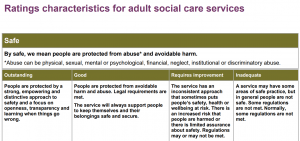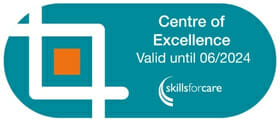Thanks to everyone who has shared their feedback with us about the CQC Hub already; please do keep it coming and remember, if you share the things that made a difference to you, we can share and make a difference to everyone in the same situation.
As we said last week, the idea of the Hub is to share best practice, ideas and tips which is why we need your feedback and input. This week, I want to focus on one of the elements in Module 5 of Lead to Succeed – Leading and Managing the Inspection Process – which is naturally focussed on CQC.
During Module 5, one of the key documents we use is this:
If you have not seen or used this document, download it and call me for a coaching session with it – it is super useful!
About halfway through the document (page 30), CQC describes the “rating characteristics”, partly where the “always room for improvement” comes from.
Hidden in the first set of rating characteristics is a really useful sentence and I have included a screenshot below:
The sentence is embedded in the characteristics of an “outstanding” provider and remember this is a CQC document…
“Openness, transparency and learning when things go wrong”
The reason that sentence is so powerful is, we know that CQC knows that stuff goes wrong! in fact they are so convinced that stuff goes wrong that they go looking for it. If your records show that everything is perfect and nothing ever goes wrong what does that tell them? This is the real world, we make mistakes, we are human, we have global pandemics to cope with and sometimes, we don’t achieve exactly what we set out to do.
AND… That is okay…
It is okay, as long as we are open and transparent about what went wrong.
It is okay as long as we learn from it and endeavour to reduce the likelihood of it happening again.
It is okay provided we do the learning…
This is where it gets interesting… Have you ever been in the situation where there has been a meds error? Or possibly repeated medication errors over a period of time? What do we do? Well, we have to demonstrate to CQC that we have done something about it (see the sentence earlier on learning and transparency).
So everyone goes on medication training…
That fixes the issues for a while, maybe… then it happens again…
So everyone goes on medication training… AGAIN
Ever been there? Have you ever been the person on the course who didn’t make the error and had to repeat the training, just in case, just so we could show CQC that we did something?
Did going on the training fix the issue? Not really, only perhaps partly. Did it provide us with the evidence CQC are looking for?
IT DEPENDS!
It depends (there used to be a button for that); did repeating the training really facilitate learning? Maybe, partly, possibly, sort of, who knows… Either way, it is woolly at best.
Learning when applied in practice will usually result in a change in behaviour, i.e. learning will impact on someone’s practice, therefore when the meds error happens again, it becomes training, not learning. Note that CQC do not describe “outstanding” providers as:
Openness, transparency and TRAINING when things go wrong…
CQC has shared its evidence that outstanding providers learn when things go wrong and it is an important distinction.
We want to be part of your learning journey – give us a call and find out how…






